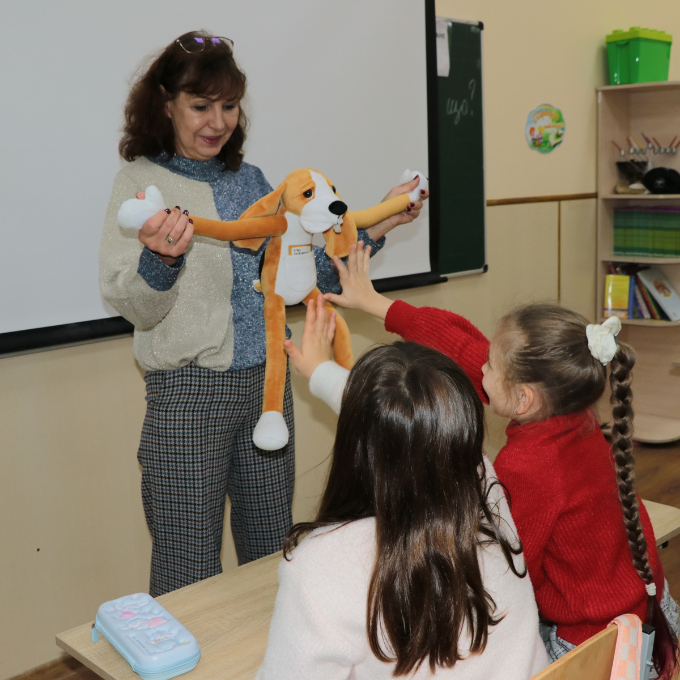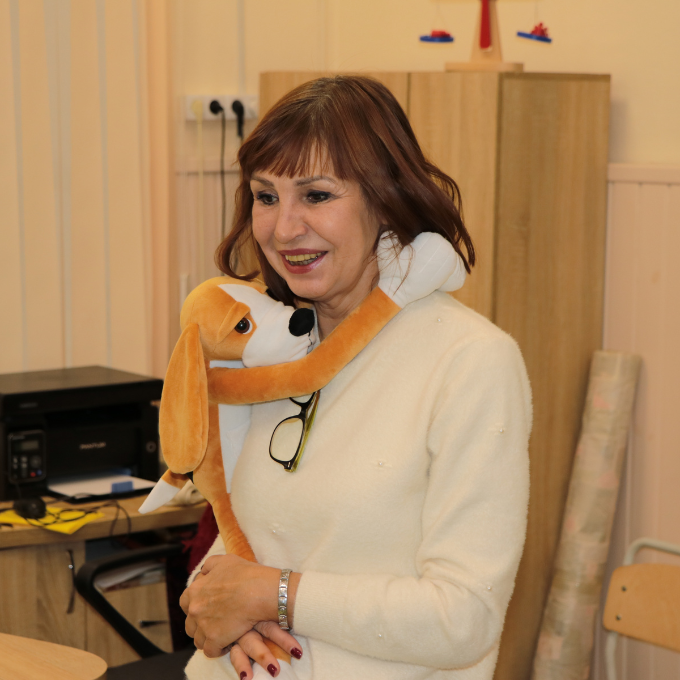A special therapy is being used with great success to support traumatized children in an ORT school in Ukraine.
The Hibuki therapy program, a psychological initiative that was developed in Israel, was introduced last year at the Odesa ORT Zhabotinski Lyceum #94 to support the mental health and emotional wellbeing of students.
The program, for children in grades two to six (ages eight to 11), began in the last academic year with introductory group sessions. Designed to help children cope with stress, anxiety, and emotional challenges, it was followed up by small-group trainings, and individual consultations.
Hibuki is derived from the Hebrew hibuk, meaning ‘hug’ and involves the use of a plush therapy toy in the form of a dog with mournful eyes, a sad face, and long arms that can be wrapped around a child. Trained professionals encourage their young patients to process their own distress and fears by projecting them onto the toy. They then care for the toy, thereby also caring for themselves.
Priority areas for intervention were identified based on evaluations by the school’s certified Hibuki trainer Tatyana Protasova and the school psychologist Liliia Danylevych.
Children shared their feelings in a safe environment and learned how to express themselves openly. Using the Hibuki therapy dogs, they role-played and treated the dolls as trusted friends. Together with the trainer, they practiced simple breathing and relaxation techniques to calm themselves when feeling anxious.
The sessions also included games and group activities that fostered teamwork and mutual support. Children often spoke about everyday challenges at school or at home, drew pictures, and created stories with Hibuki. These activities helped them to better understand and communicate their emotions and left them with increased confidence and practical coping skills.
Ms Protasova, who is also a maths teacher and has a background in psychology, explained: “During the war, it is especially important to give children back their childhood. It is important to help them release the tension and stress that build up from the fear of explosions, air raid sirens, and lack of sleep.
“These hugs [with Hibuki] are priceless in times of war. Children love to hug, and they love to hug Hibuki, and even make their Hibuki dolls hug each other. Through this, they learn to express their feelings and relieve tension.”

Feedback from students and parents has been overwhelmingly positive, highlighting the program’s effectiveness in improving emotional resilience and wellbeing.
One mother, whose children are in grades six and four, said: “I want to say thank you from the bottom of my heart for the Hibuki therapy.
“My children’s father was killed in the war. It was the hardest moment in our lives, and I didn’t know how to help them with their pain. The Hibuki therapy sessions gave them a place in which to speak about their feelings and not feel alone.
“I saw how carefully and kindly the specialist supported them and, little by little, they started to smile again.”
School principal Larisa Fainshtein said: “Our students face anxiety, uncertainty, and fear for their loved ones every day. This inevitably leaves a deep mark on their emotional state and affects their learning, communication, and development.
“In such circumstances, our task is not only to provide quality education, but also to create a space of care, security, and recovery. This is where the Hibuki group becomes especially important. ‘Hibuki’ is not only about psychological assistance; it is also a way to make learning more humane, modern, and focused on the needs of the child.”

In June, Ms Protasova’s house in Odesa was severely damaged in an attack, and her car was also destroyed. World ORT provided her with financial support through the organization’s emergency campaign.
The Hibuki therapy is also being used in the special needs resource center at two ORT schools in Kyiv and at the ORT-affiliated school in Bila Tserkva. The therapy doll was invented during the 2006 Second Lebanon War.
In the past decade, it is believed to have helped around 150,000 children in Israel and worldwide during conflicts and mass disasters, including tsunamis in Japan and earthquakes in Turkey. It has also been used to treat children in Israel in the aftermath of the October 7 attacks.
It was introduced in Ukraine in 2023, and the dolls have since been used by around 20,000 Ukrainian children suffering from psychological distress.
The funding of the Hibuki therapy in Odesa was made possible thanks to donations from the Associated Jewish Federation of Baltimore. The US city is Odesa’s sister city; the partnership was established in 1974 and promotes mutual cooperation between the two metropolises.